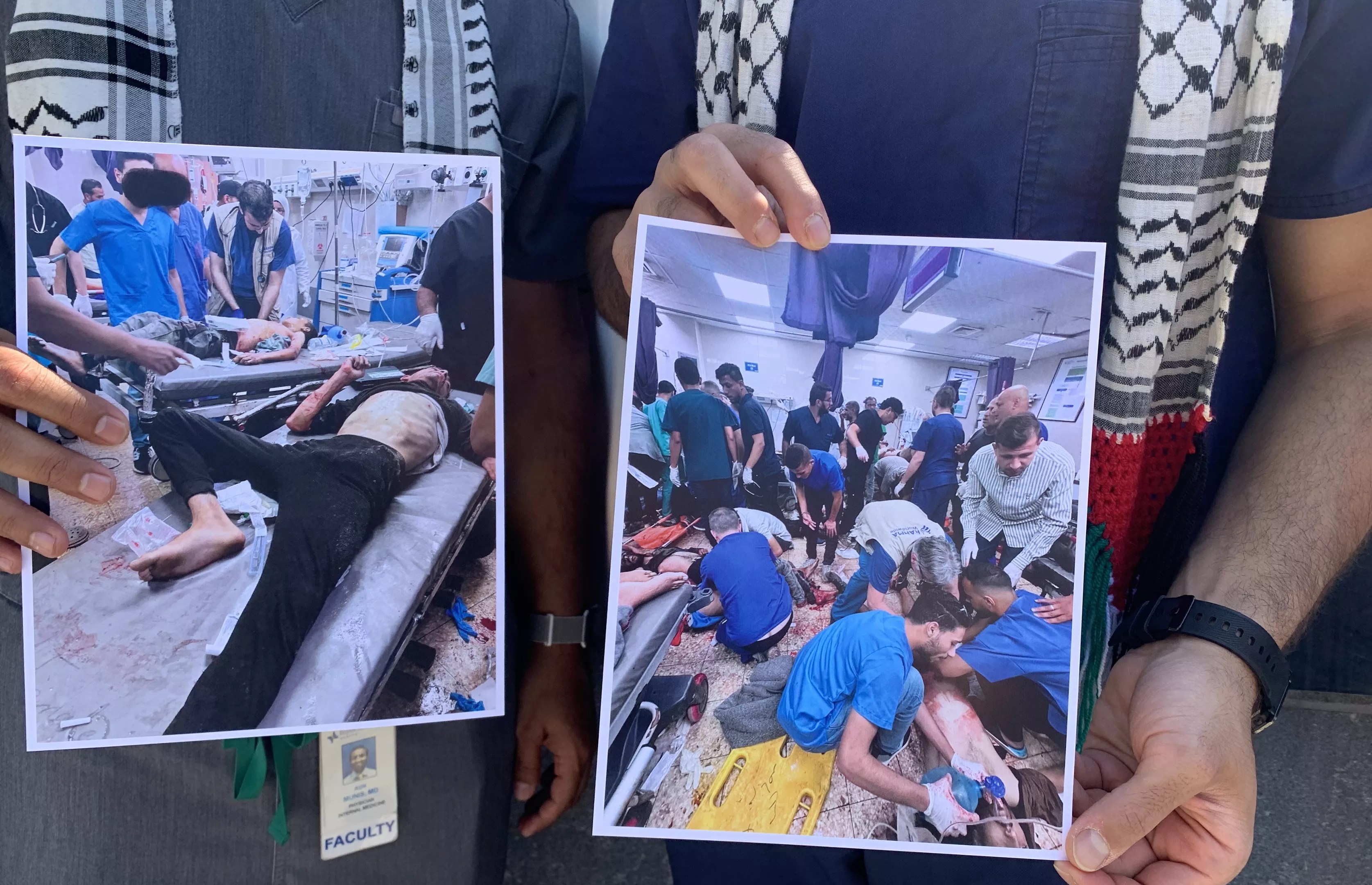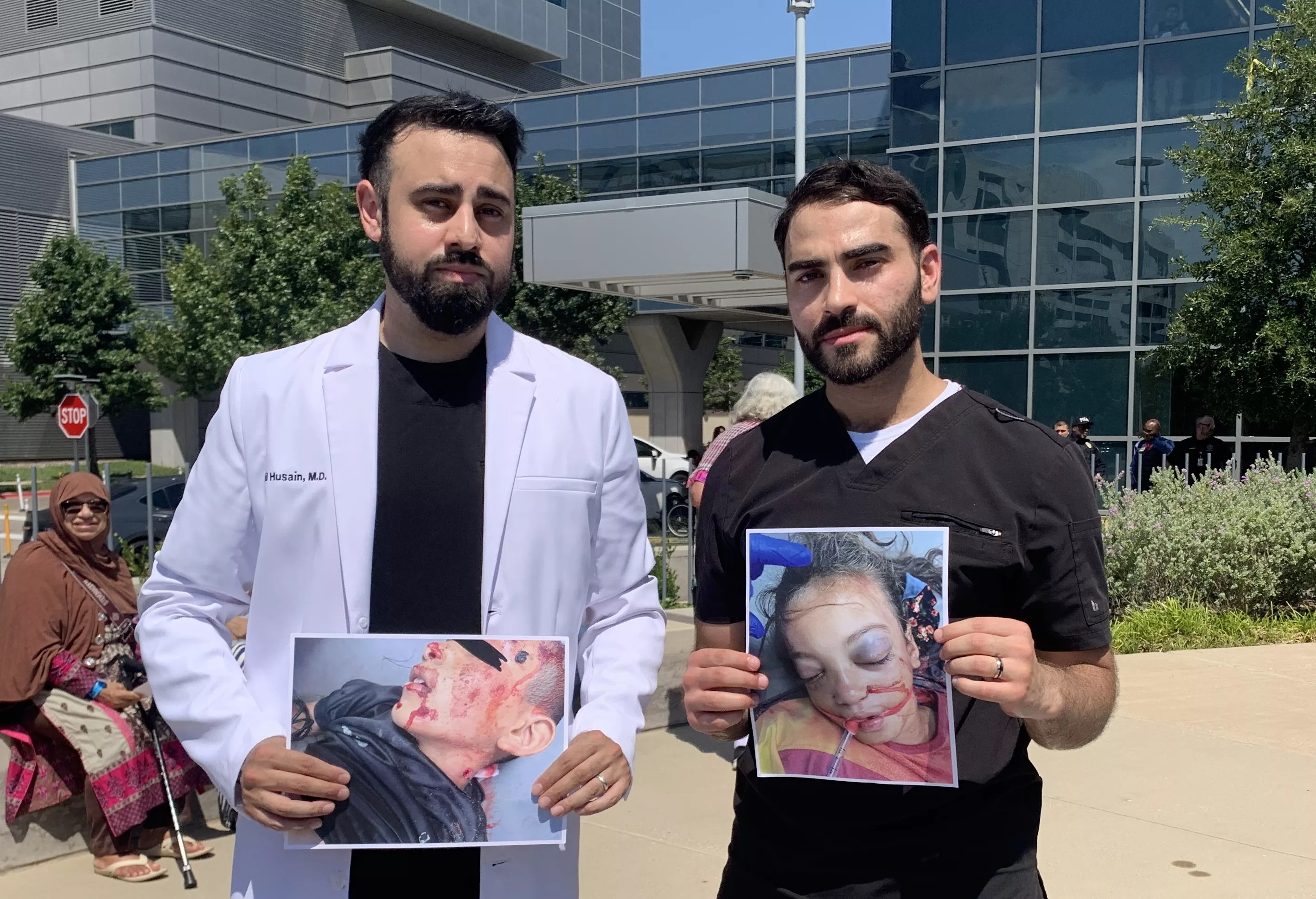
Emma Ruby

Audio By Carbonatix
A group of Dallas physicians gathered outside of Parkland Memorial Hospital on Thursday afternoon to describe what they see as a systemic effort by Israeli officials to block “much-needed medical supplies and personnel” from entering the Gaza Strip.
Four doctors from North Texas who have administered medical care in Gaza in recent months spoke at the press conference. They described treating injuries from airstrikes, gunshot wounds and malnutrition.
Dr. Nour Sharaf, an emergency medicine specialist who did her residency at Parkland, returned from the conflict zone last week. She told reporters that the blood still visible on her sneakers belongs to patients who were injured by Israeli airstrikes. Sharaf said she was a part of a six-doctor cohort that attempted to travel to Gaza to administer medical aid, but she was the only doctor granted security clearance into the country.
“No amount of training I could have ever done in this building, or any other hospital for that matter, would have ever prepared me to do critical procedures on patients [who lay] on a dirty hospital floor, who were undersedated,” Sharaf said. “​​The injuries I witnessed are somewhat difficult to grasp, even for someone who is accustomed to seeing trauma regularly. Horrific is quite literally an understatement.”
According to a May report by the World Health Organization, only 19 of the Gaza Strip’s 36 hospitals remain operational, although Sharaf and her colleagues argued that “operational” is a generous assessment of their conditions. Sharaf said that at one point, she was left to conduct surgeries by flashlight.
Dr. Khaled Al-Hreish, who worked at Nasser Hospital in southern Gaza in July, said that while the hospitals are being flooded with trauma patients, blood shortages have left it impossible to treat many extreme injuries. He witnessed less extreme injuries, and infections like sepsis, also resulting in death, “solely because we did not have the beds or the basic equipment to save them.”

Dr. Adil Hussain and Dr. Khaled Al-Hreish both attempted to smuggle baby formula into the Gaza Strip.
Emma Ruby
Multiple doctors said they were forced to turn over medical supplies to officials in Israel before being allowed into Gaza. Restrictions on medical supplies entering the conflict zone have been recorded by organizations including Physicians for Human Rights and Doctors Without Borders.
Al-Hreish noted that in addition to medical supplies being confiscated, officials took 34 containers of baby formula from his bags before admitting him into the country.
The testimony of Sharaf, Al-Hreish and doctors Adil Hussain and Bilal Piracha comes as Israel faces mounting global pressure to lessen the burdens placed on aid organizations attempting to enter Gaza. Earlier this week, the foreign ministers of 27 nations issued a joint statement condemning the “famine … unfolding before our eyes,” and urging Israel to allow “a flood of aid” into the region.
Sharaf, Al-Hreish, Hussain and Piracha are among nearly 100 healthcare workers from across the U.S. who have volunteered in Gaza and plan to travel to Washington next month to call for a ceasefire in the war between Hamas and Israel and unrestricted humanitarian aid into the Gaza Strip. The group, Healthcare Workers for Humanity, hopes to speak with members of Congress about what they witnessed overseas.
In the meantime, Hussain, an emergency medicine doctor, told the Observer that his “heart is still out there” with the Nasser Hospital where he lived and worked for two weeks in July. He is already planning to return, even though getting into the country is a lengthy and uncertain process.
To get into Gaza, he registered his name with an aid organization, and after two months of back and forth, was given a two-week notice to fly into Amman, Jordan. He flew to Jordan, not knowing if Israel had approved his security clearance; of the 21 doctors he applied with, he was one of only six admitted. He crossed from Jordan into Israel and underwent military questioning.
Many of his colleagues had their bags checked at that checkpoint; his, though, wasn’t.
“I got lucky. I got to bring in baby formula. I got medications in,” Hussain said. “We visited all the [malnourished] babies, wrote names on all the formula and delivered it to them. That was pretty surreal; from the shelf of a Costco in Plano, Texas, directly to the hands of the people of Gaza. But it’s a band-aid. It only lasted for a couple of days. They’re relying on help.”